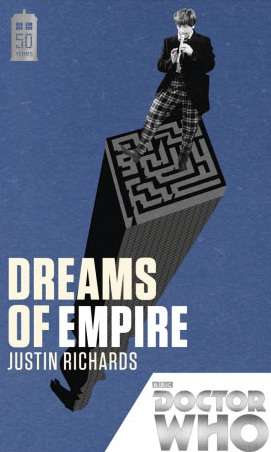The once-great Haddron Republic stands on a knife's edge. A civil war has shaken the government to the breaking point, with Consul General Kesar having tried - and failed - to lead a military revolution that would have made him Emperor. His fellow Consuls - both close friends since childhood - elected to see Kesar exiled rather than executed, thinking their friend more dangerous as a martyr than as a prisoner.
Now confined to the distant asteroid of Santespri, Kesar himself is hidden away behind an iron mask and special life-supporting armor. This was, it was said, a necessary step following Kesar's disfigurement and near-fatal wounding following an assassination attempt after his sentencing. Yet there are those who share Kesar's Dreams of Empire and believe that though he is wounded and weakened, Kesar is still the only man capable of restoring the glory days of the Republic.
It is into this conflict that The Doctor and his companions Jamie and Victoria wander, arriving on Santespri on the same day that Kesar's old friend and military opponent Consul Trayx has come to inspect the facility. Questions arise immediately, as the crew of the TARDIS uncover a dead body in the heart of the heavily secured facility. And far above them all, a silent ship approaches the prison with an unknown crew and unknown goals...

Your opinion of Dreams of Empire may depend upon how you feel about adherence to certain tropes in Classic Doctor Who. It is fair to say that author Justin Richards succeeded in capturing the feeling of a classic Second Doctor story. Unfortunately the story he chose to emulate was not a particularly memorable one, the action of this story being centered upon yet another Base Under Siege.
That said, Richards has a number of good ideas that do dress up the standard plot. The basic conceit of the story, as Richards explains in his introduction, came from him wondering what might have happened had Julius Cesar not ridden a wave of popularity onto the Emperor's Throne. Hence the Roman Empire becomes the Haddron Republic, the Legionaries are replaced with kill-bots and all the other names and dates are filed off. Thrown in a bit of The Man In The Iron Mask ala Darth Vader and a metric ton of chess metaphors and you have yourself a Doctor Who story!
This works much better than it should because Richards takes the time to develop Kesar, Trayx and the rest of the supporting cast as individuals before introducing The Doctor and his companions into the mix. It is a small thing but it does help to increase the reader's interest. It also helps that Trayx, in defiance of every other trope regarding military leaders in a Doctor Who story, is a competent, intelligent man who is not ready to shoot first and ask questions later when three oddly-dressed civilians appear in the middle of his prison at the same time a guard turns up dead.
This, ironically, is the book's greatest problem - the supporting cast are much more interesting and proactive than The Doctor and his companions! It is clear that Richards had great fun thinking up these characters and there is a good deal of human interest - from the subplot involving Trayx's wife and her dark secret to the forbidden romance between Kesar loyalist Haden and Republican soldier Darlking. It's a shame then that he gives Victoria and Jamie so little to do as the story progresses and even The Doctor is largely passive for the majority of the book.
Then again, while this is aggravating from a writer's perspective, it is also indicative of the Doctor Who stories of the era. Victoria was always one of the more passive, scream-prone female companions and Jamie - even at his best - has rarely been utilized anything other than dumb muscle, existing only to do The Doctor's heavy lifting and to give him someone to be talked at when things need explaining. Allowing for those limits, Richards does perfectly capture the voices of both characters and he does a particularly fine job of capturing the essence of Patrick Troughton's "cosmic hobo" antics.
Bottom Line: If you're a Second Doctor fan, you'll love it. Everyone else will probably like it too, if they can suffer through Victoria's constant screaming and Jamie's constant grumbling while everyone else gets on with the plot.

No comments:
Post a Comment